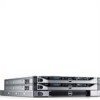Dell PowerVault NX3500 Administrator's Guide - Page 30
Best Practice Solution in the High Availability Option, Jumbo frames 9216 MTU
 |
View all Dell PowerVault NX3500 manuals
Add to My Manuals
Save this manual to your list of manuals |
Page 30 highlights
Table 2-1. Switch Topologies for PowerVault NX3500 in the Non-Redundant and High Availability Options Topology Description High-Availability Non-Redundant Best practice This topology leverages the best Figure 2-1 Figure 2-2 solution practices of the industry relating (recommended) to iSCSI and separates the SAN and LAN/Client traffic. The client cables are connected to a client switch and the SAN cables are connected to a SAN switch. All-in-one solution A basic topology where the SAN and the client cables are connected to the same switch. Figure 2-3 Figure 2-4 The following settings are recommended on your switch: • Spanning Tree Portfast • Flow control • Jumbo frames (9216 MTU) For information about configuring the above settings, see your switch documentation. Best Practice Solution in the High Availability Option In the high availability option, the SAN traffic is isolated from the LAN/client traffic. While one set of redundant switches hosts SAN/internal traffic, another set of redundant switches hosts the LAN/client network traffic. All the client cables are split between the redundant client switches, and the SAN/internal network cables are split between the redundant SAN switches. Peer connections are always back to back. NOTE: The NX3500 solution expects that only two iSCSI ports per controller would be used by the solution. The other four ports are dedicated to block devices. 30 Setting Up Your PowerVault NX3500 Solution















